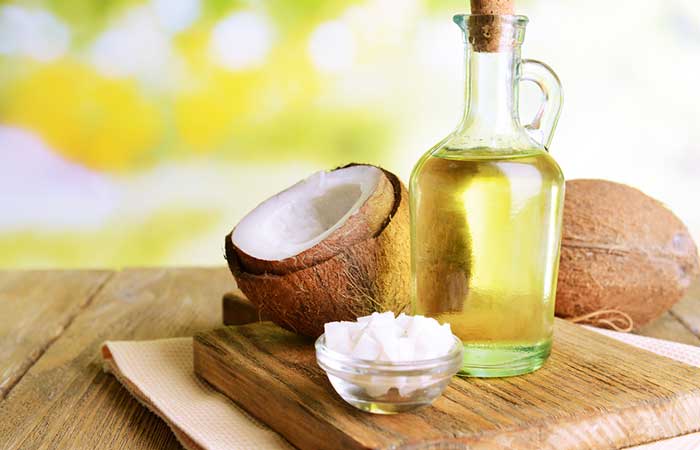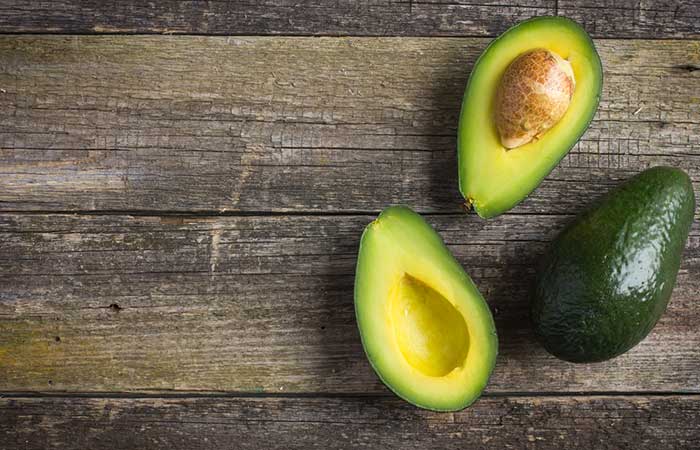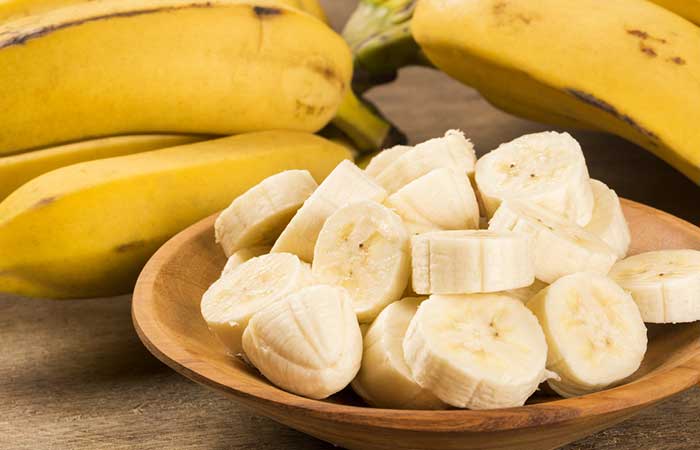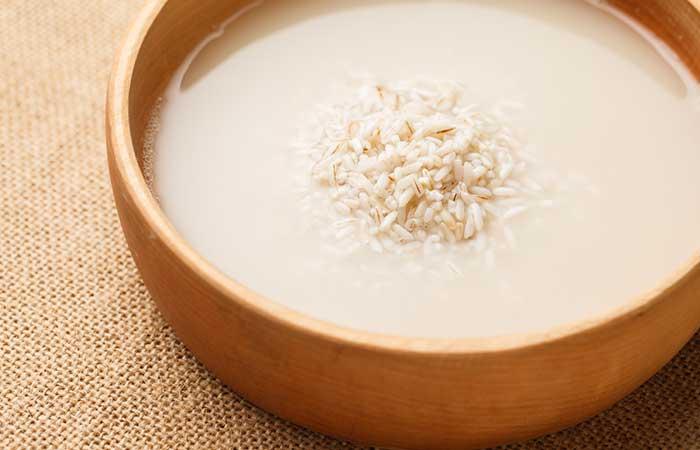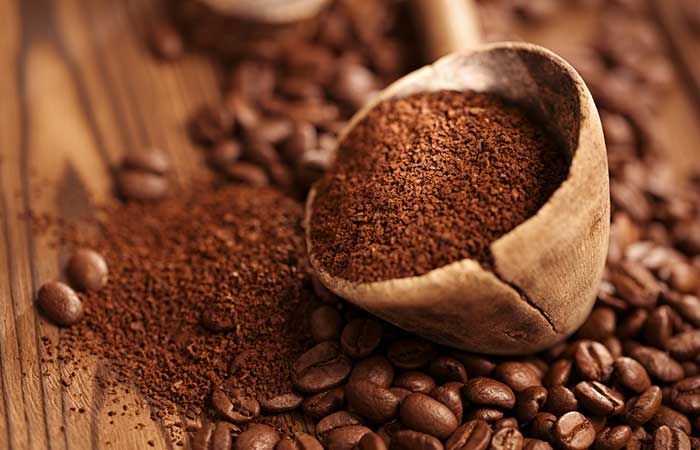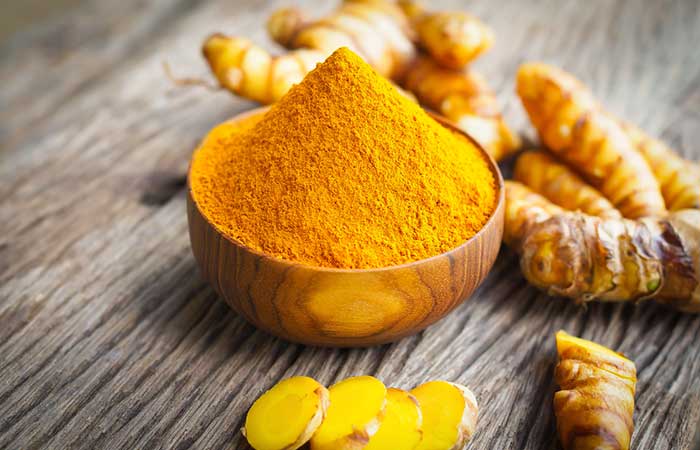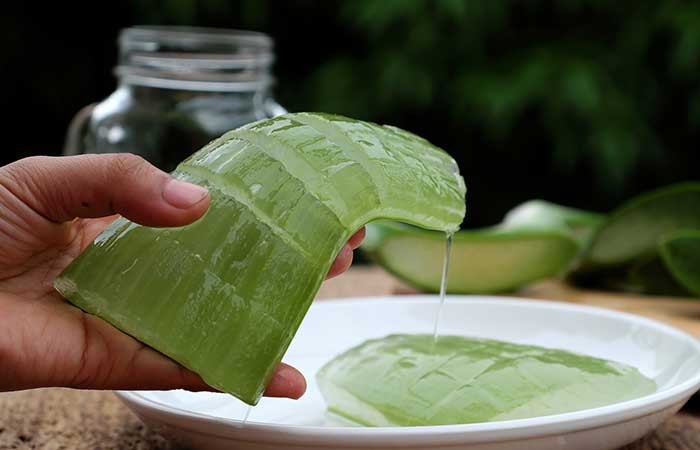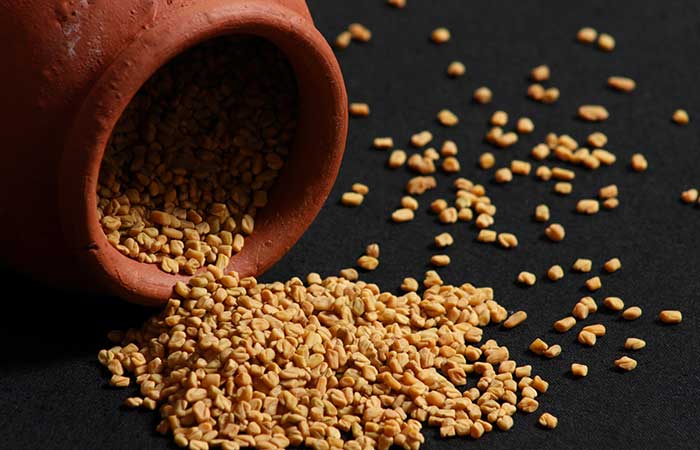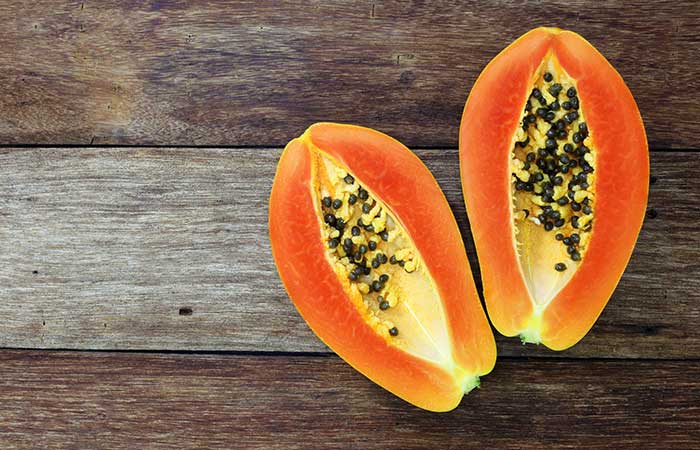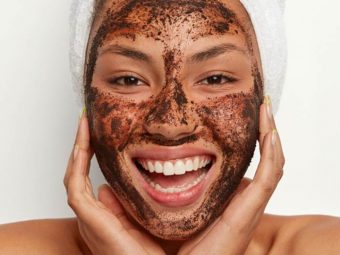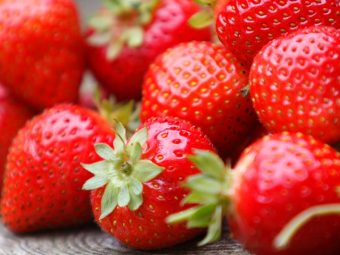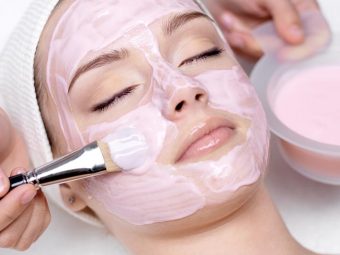Anti Aging Face Masks You Must Try At Home – Our Top 15
Keep the signs of aging at bay with these simple face packs in your skincare routine.
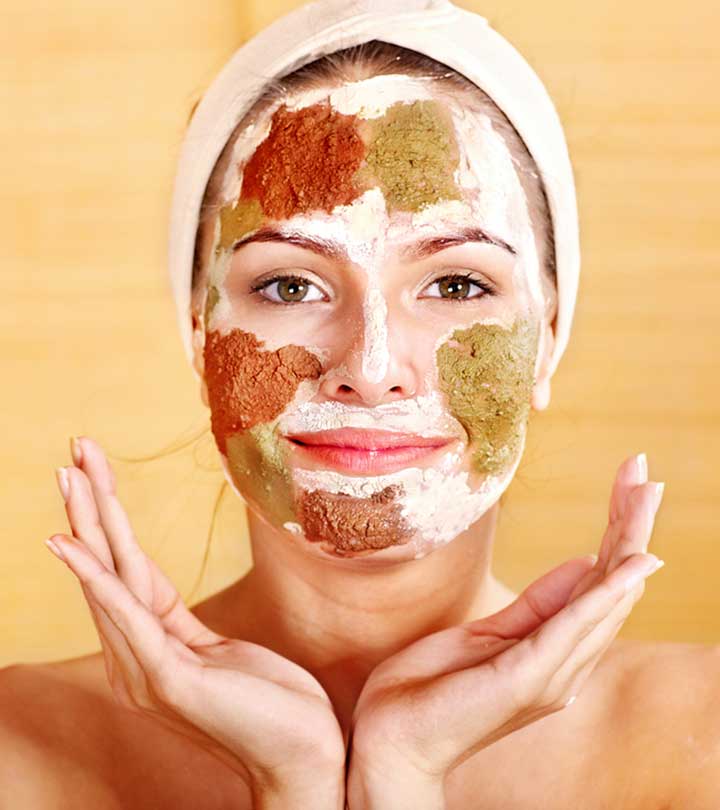
Once you are in your mid-twenties, you get extra conscious of the aging signs that appear on your skin. You start trying several anti-aging products available on the market, but not everything works on you. That is when preparing anti-aging masks at home helps. These are safe treatments that help combat aging signs and make your skin look fresh and youthful. The homemade masks are easy ones loaded with nutrients that make your skin glow and prevent dullness and dry skin. Keep reading to know some of the best DIY anti-aging face masks you can prepare at your home.
In This Article
Homemade Anti-Aging Face Masks
- Coconut Oil Face Mask
- Bentonite Clay Face Mask
- Avocado Face Mask
- Banana Face Mask
- Rice Water Face Mask
- Coffee Face Mask
- Seaweed Face Mask
- Turmeric Face Mask
- Cucumber Face Mask
- Potato and Carrot Face Mask
- Aloe Vera Face Mask
- Fenugreek Face Mask
- Orange Peel Face Mask
- Papaya Face Mask
- Glycerin Face Mask
1. Coconut Oil Face Mask
You Will Need
- 1 tablespoon coconut oil
- 1/2 tablespoon pomegranate seed oil
What You Need To Do?
- Take a bowl and mix the coconut and pomegranate seed oils. Apply the mixture to your clean face and neck.
- Let it stay on your skin for an hour and wash it off.
How Often?
You can use this mask daily.
Why This Works?
The face mask makes the skin firm and reverses skin damage. It protects the skin from sun tanning and revives it (1).
2. Bentonite Clay Face Mask
You Will Need
- 2 teaspoons bentonite clay
- A few drops of rosehip oil
- A few teaspoons of water
What You Need To Do?
- Mix the clay, oil, and water in a non-metallic bowl until it forms a paste and apply it all over your face and neck.
- Let it dry for 10-20 minutes and then wash it off with warm water. Pat dry.
How Often?
You can apply this mask twice a week.
Why This Works?
The mask repairs damaged tissues and rejuvenates the skin. It reduces fine lines and wrinkles and fights skin infections.
3. Avocado Face Mask
You Will Need
- Half an avocado
- 1 tablespoon of oats
What You Need To Do?
- Smash the avocado in a bowl and add oats to it. Apply the mask to your face and keep it on for 10-20 minutes.
- Then, rinse it off with warm water and pat dry.
How Often?
You can apply this mask 2-3 times a week.
Why This Works?
The mask is rich in antioxidants that fight the effects of aging – sagging skin, fine lines, wrinkles. Avocado also helps protect the skin from UV radiation (2).
4. Banana Face Mask
You Will Need
- 1 banana
- 1 teaspoon of rose water
What You Need To Do?
- Smash the banana in a bowl and add rose water to it. Mix it well and apply the mixture to your face and neck.
- Let it dry for 15-30 minutes and then rinse it off with cold water. Pat dry.
How Often?
You can apply this mask every alternate day.
Why This Works?
The mask is rich in vitamin E and A that heal the skin and add a glow to it. It eliminates pigmentation and unevenness of skin tone.
5. Rice Water Face Mask
You Will Need
- 1 cup of rice water
- Paper towels
What You Need To Do?
- Take a cup of rice water and soak a paper towel with holes punctured in it for the eyes, nose, and mouth. Soak the towel in rice water for 10 minutes.
- Take it out and wring it gently. Place it on your face for 15-30 minutes. Finally, remove it and wash your face.
How Often?
You can do this every day.
Why This Works?
The mask contains flavonoid compounds that fight aging. It also firms and tightens skin (3).
6. Coffee Face Mask
You Will Need
- 1 tablespoon coffee
- 1 teaspoon cocoa
- 1 teaspoon coconut oil
What You Need To Do?
- Take a bowl and mix the coffee and cocoa powder. Add coconut oil to it to form a paste. Apply the paste on your face and neck.
- Allow it to dry for 15-30 minutes. Then gently remove it by exfoliating with cold water. Pat dry.
How Often?
You can use this mask 2-3 times a week.
Why This Works?
The mask smoothens the face and reduces the fine lines on it. It clears the skin by removing dead skin cells and has anti-aging properties (4).
7. Seaweed Face Mask
You Will Need
- 1 tablespoon seaweed powder
- 2 tablespoons lukewarm water
What You Need To Do?
- Take a bowl and mix the seaweed powder with warm water until it forms a fine paste. Apply it on your face and let it dry for 15-30 minutes.
- Wash it off with water and pat dry.
How Often?
You can apply this mask 3-4 times a week.
Why This Works?
The mask smoothens, tones, and moisturizes the skin. It contains vitamin C, which increases skin elasticity (5).
8. Turmeric Face Mask
You Will Need
- 1 tablespoon Kasturi turmeric powder
- 3 teaspoons rose water
What You Need To Do?
- Add rose water to the bowl containing Kasturi turmeric powder and mix them well till a fine, thick, paste-like consistency forms.
- Apply the mixture on your face and neck gently and leave it on for 20 minutes. Rinse it with cold water and pat dry.
How Often?
You can apply this mask every alternate day.
Why This Works?
The mask is anti-inflammatory, antibacterial, and antioxidant. It brightens the skin and reduces skin pigmentation (6).
9. Cucumber Face Mask
You Will Need
- Half a cucumber
- 1 tablespoon of lemon juice
What You Need To Do?
- Grind the cucumber and add lemon juice to it. Apply it on your face and let it stay for 10-20 minutes.
- Rinse the mask with cold water and pat dry.
How Often?
You can apply the mask every day.
Why This Works?
The mask contains enzymes that work on your skin to make it look younger and brighter. It also refreshes the skin (7).
10. Potato And Carrot Face Mask
You Will Need
- 1 medium-sized potato
- 1 medium-sized carrot
- 1 teaspoon rose water
What You Need To Do?
- Grind the potato and carrot together and keep in a bowl. Add rose water to the paste and mix well.
- Apply the paste on your face and neck and leave it on for 20 minutes. Rinse the mask off and pat dry.
How Often?
You can apply this mask every day.
Why This Works?
The mask heals skin blemishes and dark circles, and brightens the skin. It contains vitamin A, which reduces the appearance of wrinkles on the skin (8).
11. Aloe Vera Face Mask
You Will Need
- 2 tablespoons of aloe vera extract
- A few drops of lime juice
What You Need To Do?
- Add the lime juice to the aloe vera extract and mix it well. Apply it on your face and let it dry for 10 minutes.
- Rinse the mask off your face and pat dry.
How Often?
You can apply this mask every day.
Why This Works?
The mask is healing and rejuvenating. It prevents collagen damage and works inside-out to prevent wrinkles from appearing (9).
12. Fenugreek Face Mask
You Will Need
- A small cup of fenugreek seeds soaked overnight
- 1 teaspoon rose water
What You Need To Do?
- Grind the fenugreek seeds and add rose water to it to form a fine paste. Apply the mixture on your face and let it stay for 20 minutes.
- Rinse it with cold water and pat dry.
How Often?
You can use this mask 3-4 times a week.
Why This Works?
The mask reduces lines and wrinkles on the face. It exfoliates the skin, reduces tan, and adds a glow to your skin (10).
13. Orange Peel Face Mask
You Will Need
- 1 tablespoon orange peel powder
- 1 teaspoon sandalwood powder
- 1 tablespoon rose water
What You Need To Do?
- Mix the orange peel powder and sandalwood powder and add rose water to it. Mix the three of them to form a paste.
- Apply the paste on your face and neck and leave it on for 20 minutes. Rinse after the mask dries and pat dry.
How Often?
Apply this mask 2-3 times a week.
Why This Works?
The mask reduces oxidative stress in skin cells, which helps in making your skin firm. It renews worn out cells and prevents the formation of wrinkles (11).
14. Papaya Face Mask
You Will Need
- A portion of a papaya
- 1 tablespoon lemon juice
What You Need To Do?
- Smash the papaya in a bowl and add lemon juice to it. Apply the paste on your face and neck and let it dry for 20 minutes.
- Rinse the mask and pat dry.
How Often?
You can apply this mask every day on your face.
Why This Works?
The mask removes dead skin cells and renews skin. It protects cells from free radical damage and helps retain skin elasticity (12).
15. Glycerin Face Mask
You Will Need
- 1 teaspoon vegetable glycerin
- 2 vitamin E capsules
What You Need To Do?
- Pinch the vitamin E capsules and add it to the glycerin. Mix them well and apply it to your face and neck.
- Leave it on for 30 minutes and rinse your face.
How Often?
You can apply this mask every day.
Why This Works?
The mask moisturizes and heals your skin. It unclogs pores and reduces fine lines. It also nourishes the skin and maintains its health.
[ Read: 15 Amazing Homemade Chocolate Face Masks For Flawless Skin ]
The signs of aging may not pose any serious health effects, but they may affect the appearance of your skin. Preparing anti-aging face masks at home and using them regularly is an effective way to deal with the signs of aging. These face masks can be prepared with coconut oil, bentonite clay, avocado, banana, rice water, coffee, turmeric, cucumber, aloe vera, carrot, potato, papaya, and fenugreek. These face masks can be applied once or twice a week to reduce the appearance of fine lines and wrinkles. Try including these face masks in your skin care regimen to reap their benefits.
Frequently Asked Questions
Do homemade anti-aging face masks work?
Yes, they do. The masks take time to show results though. You need to be patient and be consistent with the face packs to enjoy their anti-aging benefits.
Is it better to choose a clinical anti-aging treatment or try homemade anti-aging face masks?
It depends on your taste and urgency of the situation. If you are looking for quick results, then clinical treatments are for you; otherwise, homemade masks are good enough.
Sources
Articles on StyleCraze are backed by verified information from peer-reviewed and academic research papers, reputed organizations, research institutions, and medical associations to ensure accuracy and relevance. Read our editorial policy to learn more.
- Anti-Inflammatory and Skin Barrier Repair Effects of Topical Application of Some Plant Oils
https://www.ncbi.nlm.nih.gov/labs/pmc/articles/PMC5796020/ - Hass Avocado Composition and Potential Health Effects
https://www.ncbi.nlm.nih.gov/labs/pmc/articles/PMC3664913/ - Rice Water: A Traditional Ingredient with Anti-Aging Efficacy
https://www.mdpi.com/2079-9284/5/2/26/htm - Caffeine’s mechanisms of action and its cosmetic use
https://pubmed.ncbi.nlm.nih.gov/23075568/ - Potential Use of Seaweed Bioactive Compounds in Skincare—A Review
https://www.ncbi.nlm.nih.gov/labs/pmc/articles/PMC6950024/ - Turmeric: A condiment cosmetic and cure
https://pubmed.ncbi.nlm.nih.gov/29243674/ - Cucumis sativus fruit-potential antioxidant anti-hyaluronidase and anti-elastase agent
https://pubmed.ncbi.nlm.nih.gov/21153830/ - Improvement of naturally aged skin with vitamin A (retinol)
https://pubmed.ncbi.nlm.nih.gov/17515510/ - ALOE VERA: A SHORT REVIEW
https://www.ncbi.nlm.nih.gov/labs/pmc/articles/PMC2763764/ - Formulation and characterization of a cream containing extract of fenugreek seeds
https://pubmed.ncbi.nlm.nih.gov/20369794/ - Evaluation of Skin Anti-aging Potential of Citrus reticulata Blanco Peel
https://www.ncbi.nlm.nih.gov/labs/pmc/articles/PMC4908842/ - Beneficial Role of Carica papaya Extracts and Phytochemicals on Oxidative Stress and Related Diseases: A Mini-Review
https://www.ncbi.nlm.nih.gov/labs/pmc/articles/PMC8066973/



